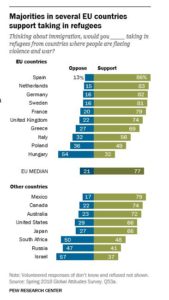Europeans support refugees but not their own leadership on the issue
 Most citizens of European Union nations support taking in refugees but they disapprove of how the EU has handled the influx of displaced people, new research has found.
Most citizens of European Union nations support taking in refugees but they disapprove of how the EU has handled the influx of displaced people, new research has found.
Three years after a record 1.3 million migrants sought asylum in Europe and as anti-migration political parties are on the rise across the continent, research by the Washington-based Pew Research Center has found broad support for talking in refugees.
The research found a majority of people in several European countries say they support taking in refugees who are fleeing violence and war but most people in these countries disapprove of the way the European Union has dealt with the refugee issue.
About three-quarters or more of adults in Spain, the Netherlands, France and the United Kingdom support taking in refugees from countries where people are fleeing violence and war, according to a global survey conducted earlier this year across ten EU countries.
Similar numbers of people in Germany and Sweden – which saw large influxes of migrants seeking refugee status in 2015 and 2016 – also back taking in refugees.
There is also majority support for taking in refugees in Greece and Italy, which have been main entry points into Europe for migrants in recent years.
The research found people in Poland and Hungary were less likely to support taking in refugees. About half in Poland (49 per cent) voice support, and only about a third (32 per cent) say the same in Hungary, where thousands of migrants sought asylum in 2015.
In June, Hungary’s parliament passed laws that made it a crime to assist asylum seekers and refugees – one reason why the European Parliament recently voted to impose sanctions against Hungary for not upholding core EU values.
Support for taking in refugees varies around the world.
About two-thirds or more of people in Mexico, Canada, Australia, the United States and Japan say they support taking refugees from countries where people are fleeing violence or war.
There is mixed support, however, in South Africa, Russia and Israel, where roughly half or fewer say they support taking in refugees fleeing violence and war, according to the Pew research.
The EU is struggling with how to handle the ongoing arrival of migrants seeking asylum on its shores.
Nearly all of these migrants arrive on the Mediterranean shores of Greece, Italy or Spain; with more than two million migrants have entered Europe this way since 2009.
About half have come from the Middle East or North Africa, including large numbers of Syrians and Iraqis displaced by conflict. Hundreds of thousands from Africa have also arrived.
While people in some EU countries support taking in refugees, there is widespread disapproval of how the EU has handled the refugee issue, the survey found.
In Greece, Sweden, Hungary and Italy, about eight-in-ten or more disapprove of the way the EU is dealing with the issue. In fact, across all 10 EU countries surveyed, majorities disapprove of how the EU is dealing with the refugee issue.
In many countries, disapproval levels with how the EU has dealt with the refugee issue have exceeded disapproval rates of the EU’s handling of the economy, according to the Pew Center’s survey.
Discontent with how the EU is dealing with the refugee issue comes as Austria holds the European Union’s presidency through the end of 2018. Austria is pushing for policies that prevent migrants from entering Europe without authorization and applying for asylum.
Laurie Nowell
AMES Australia Senior Journalist












